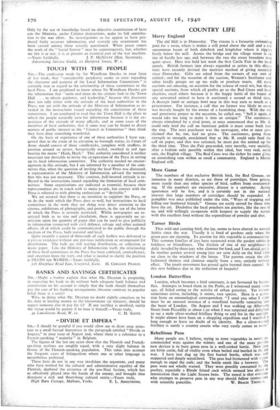TOUCH WITH THE PEOPLE
Stn,—The confession made by Sir Wyndham Deedes in your issue of last week, that " considerable perplexity seems to exist regarding the character and porpose of the Local Information Committees " is certainly true in regard to the relationship of these committees to the local Press. I am perplexed to know where Sir Wyndham Deedes got the information that more and more do the citizens look to the Town Hall . . . to obtain guidance, and leadership," because this discovery does not tally either with the attitude of the local authorities to the Press, nor yet with the attitude of the Ministry of Information as re- vealed in the instructions issued regarding the constitution of these committees. I am perplexed to read that the Town Hall is the place to which the people naturally turn for information because it is my ex- perience of the attitude of many officials, and in some cases of the members of local authorities, that if some way can be found to divert matters of public interest to the " Council in Committee " they think they have done something wonderful.
On the basis of experience of one of these authorities I have sug- gested that in the event of its elevation to borough status, its Court of Arms should consist of three candlesticks, complete with snuffers, in position around an oyster, hermetically sealed, swathed in red tape bearing the motto " Hush, Hush." This authority considered it neither necessary nor desirable to invite the co-operation of the Press in setting up its local information committee. The authority needed no encour- agement in this attitude, but I am informed by a member of the com- mittee that, when the question of inviting the local Press was discussed, a representative of the Ministry of Information advised the meeting that this was not necessary. This cautious, half-hearted attitude is re- flected in the instructions issued regarding the formation of local com- mittees Some organisations are indicated as essential, because their representatives are in touch with so many people, but contact with the Press is referred to with glowing enthusiasm as " desirable."
We are assured that there is no intention to supplant the Press, or to do the work which the Press does so well, but instructions to local committees in the work they are doing now direct attention to the cinema, exhibitions of photographs, and posters, in the use of the latter of which the Press is severely restricted. Whilst newspapers are re- stricted both as to size and circulation, there is apparently no re- striction upon the quantity of paper that can be used to give publicity to information connected with civil defence, salvage and other national efforts, all of which could be communicated to the public through the medium of the Press, both national and local.
Quite recently a parcel of thousands of such leaflets was delivered to a private residence without any previous notification or arrangement for distribution. The bulk are still waiting distribution, or collection as waste paper. Like the Ministry of Information itself, the relationship of these local committees to the Press has been confused, contradictory, and uncertain from the start, and what is needed to clarify the position is DEEDS not WORDS.—Yours faithfully, 326 Mayplace Road East, Crayford, Kent. H. GREGORY PEARCE.


























 Previous page
Previous page